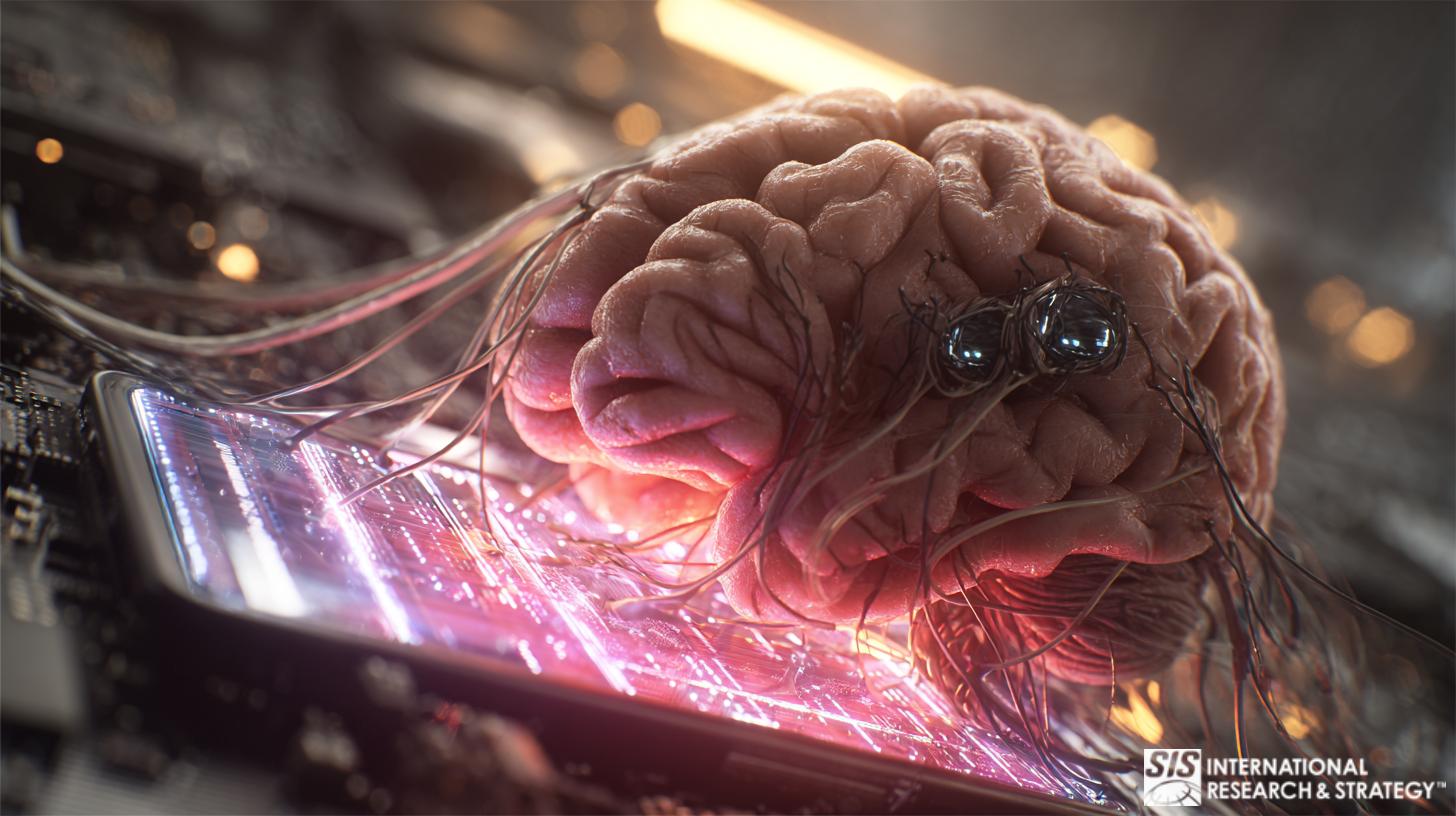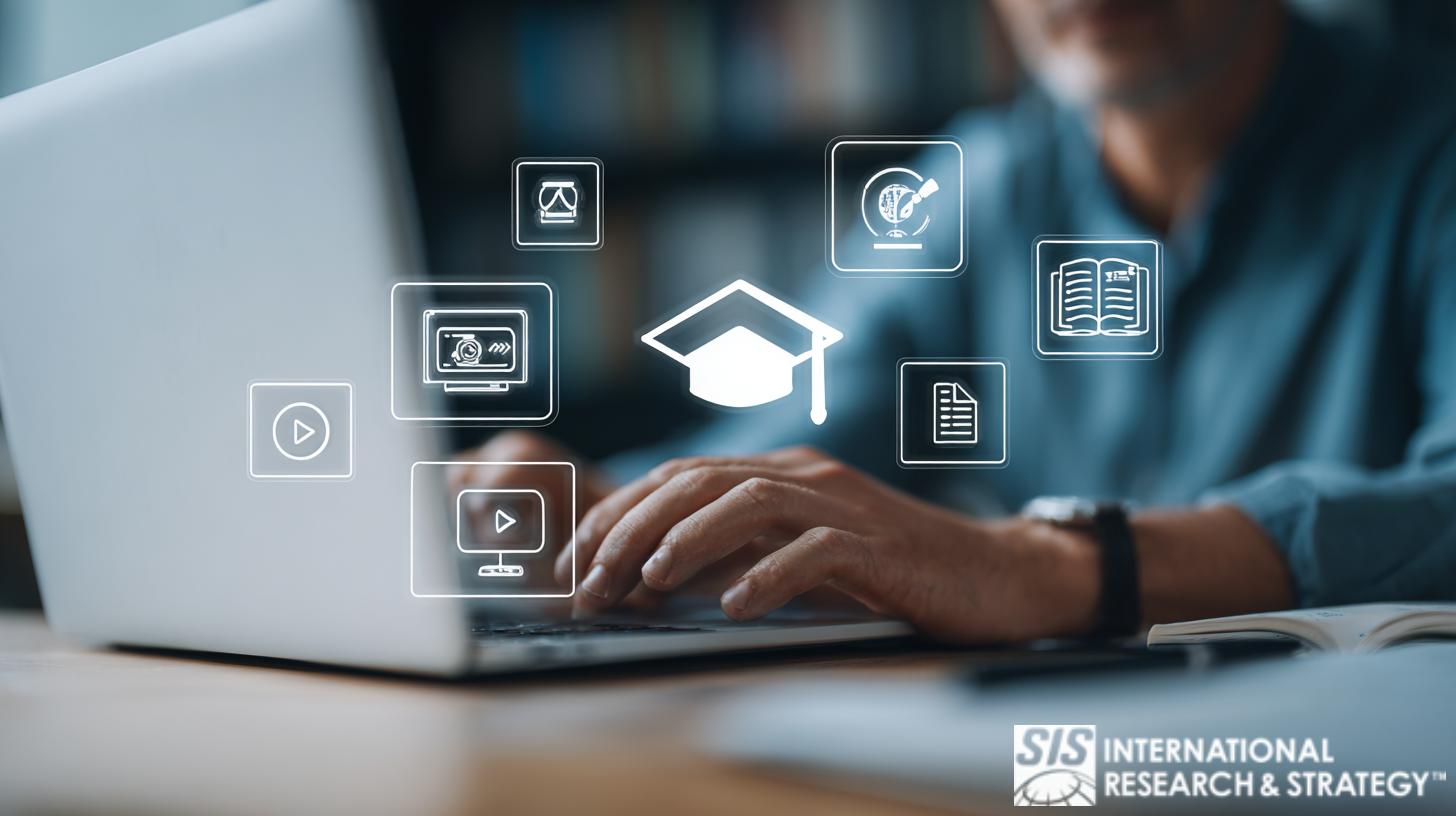E-learning en onderwijsindustrie Automatisering en AI-advies

E-learning and education industry automation and artificial intelligence consulting are transforming traditional teaching and learning landscapes, making education more accessible, personalized, and efficient.
What Is E-Learning and Education Industry Automation and AI Consulting?
E-learning and education industry automation and artificial intelligence consulting is a field that mixes cutting-edge technology with educational methodologies to revolutionize how educational content is delivered, experienced, and managed. It offers a route to more efficient educational administration, a more engaging learning experience for students – and a wealth of data-driven insights that can shape future educational strategies.
Why Do Businesses Need E-Learning and Education Industry Automation and Artificial Intelligence Consulting?

Today’s learners demand more personalized and engaging educational experiences. AI’s ability to analyze learning patterns and tailor content to individual needs means that businesses can offer more effective and customized learning solutions.
Additionally, E-learning and education industry automation and artificial intelligence consulting enable the scaling of educational services without compromising quality, making learning accessible to a broader audience. AI consulting also helps businesses in the education sector analyze this data to make informed decisions about curriculum development, teaching methodologies, and learner engagement strategies.
In any case, there are multiple benefits of e-learning and education industry automation and artificial intelligence consulting, including:
- Enhanced Learning Outcomes: AI-driven personalized learning experiences mean that content can be tailored to each student’s learning style and pace, leading to improved understanding and retention of information.
- Increased Efficiency and Productivity: Automation of administrative and repetitive tasks in the education sector such as grading and scheduling, frees up educators to focus more on teaching and student interaction, thereby increasing productivity and efficiency.
- Scalability of Educational Offerings: With consulting, educational programs and courses can be scaled up to reach a larger audience without a corresponding increase in resources or costs. This scalability is crucial for online learning platforms and institutions looking to expand their reach.
- Datagestuurde inzichten: The use of AI in analyzing educational data provides deep insights into student performance, learning patterns, and curriculum effectiveness. These insights can be used to continuously improve the quality of education.
- Enhanced Student Engagement: AI-powered tools and interactive platforms can make learning more engaging and interactive, leading to higher student satisfaction and reduced dropout rates.
When to Seek E-Learning and Education Industry Automation and Artificial Intelligence Consulting Services
Implementing e-learning and education industry automation and artificial intelligence consulting is crucial to maximize business effectiveness – and several scenarios indicate it is time for educational institutions or e-learning businesses to consider these technologies.
- Rapid Expansion or Scaling: When an educational institution or e-learning platform is experiencing rapid growth or planning to scale up, integrating AI and automation can help manage increased demands and maintain quality.
- Administrative Overload: If the administrative burden is becoming too heavy and impacting the efficiency of educational delivery, automation tools can streamline processes such as admissions, grading, and student inquiries.
- Competition and Market Trends: To respond to competitive pressure and keep up with market trends in digital education, adopting AI and automation can provide a competitive edge and align with current educational trends.
- Changing Regulatory Environment: If there are changes in educational regulations or standards, especially related to online learning and digital content delivery, this may be the right time to engage in consulting to ensure compliance.
- Feedback and Performance Indicators: Negative feedback from students or poor performance indicators can signal the need for a more engaging and effective educational approach, which consulting can facilitate.
How Does E-Learning and Education Industry Automation and Artificial Intelligence Consulting Differ from Traditional Market Research?

E-learning and education industry automation and artificial intelligence consulting significantly vary from traditional market research. Therefore, understanding these differences is crucial for effectively leveraging these technologies in education.
- Objective and Outcome: The primary objective of traditional market research is to inform marketing strategies and product development. On the other hand, e-learning and education industry automation and AI consulting aim to directly impact the quality of education by enhancing efficiency, personalization, and accessibility in learning environments.
- Technology Implementation: Traditional market research does not typically involve direct implementation of technology solutions. In contrast, e-learning and AI consulting are deeply embedded in educational services’ technological transformation, focusing on applying AI and automation tools to solve specific educational challenges.
- User Experience Enhancement: While market research may inform how products or services can be improved for a better user experience, AI in e-learning actively shapes the user experience by creating dynamic, responsive, and personalized educational platforms.
Current Trends in E-Learning and Education Industry Automation and Artificial Intelligence Consulting
The e-learning and education industry is evolving – and staying abreast of current trends in automation and artificial intelligence consulting is vital for educational institutions and e-learning platforms to remain competitive and effective. Here are some key trends shaping e-learning and education industry automation and artificial intelligence consulting:
- Gamification and Interactive Learning: Incorporating game-like elements and interactive content powered by AI is becoming more prevalent. This approach makes learning more engaging and enjoyable, leading to better retention and participation.
- AI Tutors and Assistants: AI-powered tutoring systems and virtual assistants are becoming more sophisticated, offering personalized support and guidance to students outside traditional classroom settings.
- VR and AR for Immersive Learning Experiences: Virtual Reality (VR) and Augmented Reality (AR) technologies are used to create immersive and interactive learning experiences, making complex subjects more accessible and engaging.
- Mobile Learning: With the increasing use of smartphones, mobile learning is becoming more prominent. AI is being used to optimize mobile learning content and interfaces, making education more accessible to learners.
- Sustainable and Inclusive Learning Solutions: There is a growing emphasis on using AI and technology to create sustainable and inclusive learning solutions, ensuring accessibility for learners with disabilities and those in underserved regions.
Technologies and Tools in E-Learning and Education Industry Automation and Artificial Intelligence Consulting

In the e-learning and education industry automation and artificial intelligence consulting, a range of innovative technologies and tools are being employed to enhance learning experiences and streamline educational processes. Here’s an overview of some key technologies and notable tools or brands that are making significant impacts in this sector:
- Learning Management Systems (LMS): Platforms like Canvas, Blackboard, and Moodle offer comprehensive LMS solutions that enable the creation, management, and delivery of online courses and content, often incorporating AI for personalization and analytics.
- Automated Grading and Assessment Tools: Technologies like Turnitin and Gradescope use AI to automate the grading process, providing quick and consistent assessments of student work.
- Mobile Learning Applications: Apps like Khan Academy and Coursera use AI to offer personalized mobile learning experiences, making education accessible on the go.
Kansen en uitdagingen
The integration of automation and artificial intelligence in the e-learning and education industry presents a unique set of opportunities and challenges. Navigating this landscape is crucial for educational institutions and businesses to fully harness the potential of these technologies.
Mogelijkheden
- Improved Efficiency and Cost-Effectiveness: Automating administrative tasks and utilizing AI for curriculum development and assessment can significantly improve operational efficiency and reduce costs.
- Datagestuurde inzichten: AI’s ability to analyze vast amounts of educational data provides valuable insights into student performance and learning behaviors, enabling educators to make informed decisions and improve teaching strategies.
- Scalability of Educational Offerings: E-learning platforms can easily scale their offerings to accommodate more learners without a proportional increase in resources or costs, thanks to automation and AI.
- Enhanced Student Engagement and Retention: Interactive and engaging AI-driven content can lead to higher levels of student engagement and retention.
Uitdagingen

Technical and Infrastructure Requirements: Implementing AI and automation requires significant technical infrastructure and expertise, which can be a barrier for some institutions.
- Quality and Effectiveness of AI: Ensuring the AI systems are effective and provide quality educational experiences is a continuous challenge, requiring ongoing development and refinement.
- Resistance to Change: There may be resistance from educators and learners to adopt new technologies, necessitating change management and training.
- Accessibility and Digital Divide: While AI and automation can increase accessibility, there is also the risk of widening the digital divide, where students without access to technology are left behind.
SIS Solutions: E-Learning and Education Industry Automation and AI Consulting
We provide innovative solutions to revolutionize the e-learning and education sector, making learning more accessible, personalized, and efficient. Our researchers conduct strategic analyses to turn information into actionable insights and help you consider e-learning and education industry automation and AI consulting with a complete market view – and our focus on strategic analysis and actionable insights goes beyond data and provides tailored solutions for clients.
- Personalized Learning Experiences: Leveraging AI algorithms, we enable businesses to offer highly personalized learning experiences tailored to the individual needs and preferences of each student, leading to improved learning outcomes and engagement.
- Efficient Administrative Processes: Through automation technologies, we streamline administrative tasks such as grading, scheduling, and student inquiries, freeing up educators to focus more on teaching and student interaction, ultimately increasing efficiency and productivity.
- Scalable Educational Offerings: With our consulting services, educational programs and courses can be scaled up to reach a broader audience without a proportional increase in resources or costs, ensuring accessibility and inclusivity in education.
- Data-Driven Insights for Continuous Improvement: Our AI-driven data analytics provide deep insights into student performance, learning patterns, and curriculum effectiveness, empowering educators to make informed decisions and continuously improve the quality of education.
- Enhanced Student Engagement: Utilizing AI-powered tools and interactive platforms, we make learning more engaging and interactive, leading to higher student satisfaction and reduced dropout rates, ultimately fostering a more positive learning experience.
- Compliance with Regulatory Standards: We ensure that AI and automation applications in education comply with industry standards and regulations, assisting educational institutions in navigating complex regulatory landscapes and ensuring legal and ethical compliance.
- Continuous Training and Development: We offer continuous training and development programs to equip educators with the necessary skills and knowledge to leverage AI and automation technologies effectively, facilitating smooth adoption and integration into educational practices.
Onze vestigingslocatie in New York
11 E 22nd Street, 2e verdieping, New York, NY 10010 T: +1(212) 505-6805
Over SIS Internationaal
SIS Internationaal biedt kwantitatief, kwalitatief en strategisch onderzoek. Wij bieden data, tools, strategieën, rapporten en inzichten voor besluitvorming. Wij voeren ook interviews, enquêtes, focusgroepen en andere marktonderzoeksmethoden en -benaderingen uit. Neem contact met ons op voor uw volgende marktonderzoeksproject.

